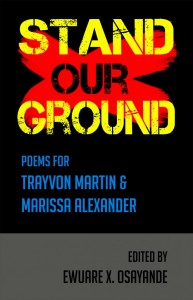By Daniel Shank Cruz
 As its subtitle indicates, Ewuare X. Osayande’s anthology Stand Our Ground: Poems for Trayvon Martin & Marissa Alexander attempts to make space for poetry within the fractious public discourse surrounding two recent examples of race-related legal injustice. Osayande explicitly ties the book to the Black Arts Movement tradition of poetry-as-social activism, writing in the introduction that Stand Our Ground “exhorts us not only to face our reality, but to act” and explaining that it contains “Poems that revolt and rebel / that holler, scream and yell” (15, 18).
As its subtitle indicates, Ewuare X. Osayande’s anthology Stand Our Ground: Poems for Trayvon Martin & Marissa Alexander attempts to make space for poetry within the fractious public discourse surrounding two recent examples of race-related legal injustice. Osayande explicitly ties the book to the Black Arts Movement tradition of poetry-as-social activism, writing in the introduction that Stand Our Ground “exhorts us not only to face our reality, but to act” and explaining that it contains “Poems that revolt and rebel / that holler, scream and yell” (15, 18).
Aside from being an important addition to the long tradition of politically activist African American anthologies, such as Amiri Baraka and Larry Neal’s Black Fire (1968) and Dudley Randall and Margaret Burroughs’s Poems for Malcolm (1969), in that it responds to America’s ongoing racism (many, but not all of the contributors are black — this diversity is one of the collection’s strengths), Stand Our Ground also fits into the broader American tradition of activist anthologies such as Michael Klein’s Poets for Life (1989) and Sam Hamill’s Poets against the War (2003). At the same time, the book also breaks the boundaries of these traditions by including poets from all over the world. Though most of the contributors are from the U.S., Stand Our Ground includes writers from Bangladesh, Canada, England, Finland, Gambia, Kenya, the Maldives, Nigeria, South Africa, Switzerland, and Trinidad and Tobago. This range speaks to how the rest of the world is aware of American human rights abuses and its intent to keep the U.S. accountable. It is inspiring to see poets at the vanguard of this action.
Stand Our Ground’s list of contributors is impressively democratic, including work by well-known authors such as Amiri Baraka, Sonia Sanchez, Haki Madhubuti, and Askia Touré alongside work by a few writers with virtually no publishing history — and all levels in between. The poets are presented as equals by organizing the poems alphabetically by author last name. Most of the poems are of the written variety, though the book also includes transcriptions of work by spoken word poets. Not all of the poems address the Martin or Alexander cases directly, but all focus on matters of social justice, especially race relations, class issues, and gender and sexuality concerns.
Baraka’s “I liked us better,” one of his final published works, resonates with themes from his Black Arts Movement heyday, asserting that “I liked us better when we were / shouting and marching and intent // On changing everything. I liked us better when we / didn’t dig white people so much” (35). No matter how uncomfortable he made his audience, Baraka spoke truth to power unabashedly up until his recent death. While his poem seems to contradict the book’s inclusive theme, its lament for the lack of social awareness in America as a whole is a moving one, and the level of its passion for the continuing fight against racism runs steady throughout the anthology.
Similarly, “Skin Color” by Latoya Carter, whose author’s note describes her as “a young inspirational poet with big dreams” (66), places Martin’s murder within the centuries-old context of American racism. The poem asserts “Because of Trayvon’s skin color / Was attacked / Shot dead” just as “Because of their skin color / Ancestors / Went through horrific journeys / Thick rope wrapped around necks” (67). Poems in the collection consistently argue that in order for injustices such as those committed against Martin and Alexander to stop, we must examine the history of racism and recognize its status as a form of systemic oppression rather than as a series of isolated incidents.
In an anthology as long as Stand Our Ground, it is inevitable some of the poems lack aesthetic quality. Some readers might wish Osayande had chosen to winnow the collection, but the decision to place poetry royalty such as Sanchez and Baraka alongside writers making their publishing debuts is a powerful statement about the necessity of unity and inclusivity in movements for social change. Regardless, there is more than enough excellent poetry in the book to make it a worthwhile investment of time.
The proceeds from Stand Our Ground’s sales will be split between Martin’s family and Alexander’s ongoing legal battle. The book is currently only available directly from FreedomSeed Press at http://standourgroundbook.com/ in order to raise the maximum amount of funds possible for its cause by cutting out the middle man. While this marketing strategy has been adopted for laudable reasons, the anthology deserves as large an audience as possible. Thus one hopes it will be made available from more outlets soon. Stand Our Ground is an essential monument to the injustices done to Martin and Alexander, proving that poetry still has both political and spiritual importance for our society. Many of its poems are first-class, and as a political text it will appeal to non-poetry readers and poetry lovers alike.
Stand Our Ground: Poems for Trayvon Martin & Marissa Alexander
Edited by Ewuare X. Osayande
FreedomSeed Press, 2013









